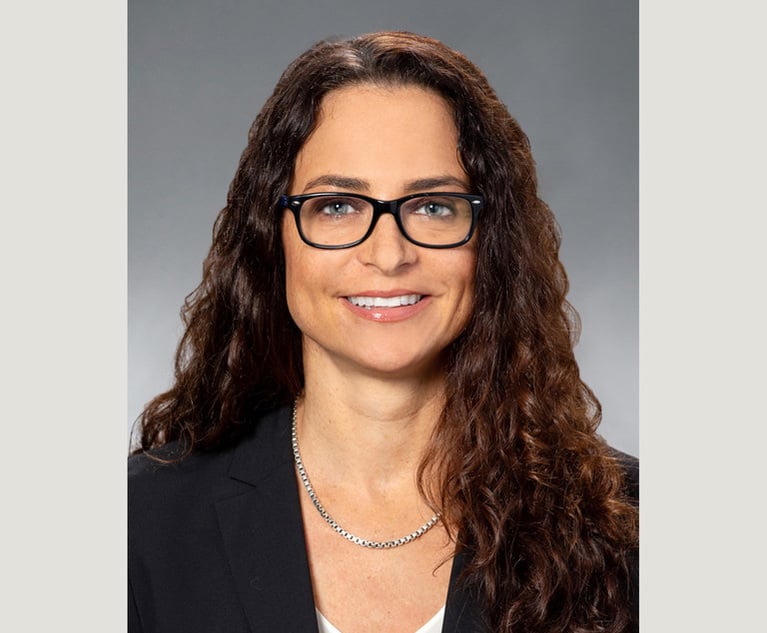Providing a Voice for the Child in Court
While a Pennsylvania Supreme Court decision in an individual's area of practice is always exciting, for child welfare attorneys, the momentous nature is heightened because decisions are infrequent.
June 26, 2017 at 05:13 PM
15 minute read
While a Pennsylvania Supreme Court decision in an individual's area of practice is always exciting, for child welfare attorneys, the momentous nature is heightened because decisions are infrequent. Child welfare attorneys are attorneys who, in Philadelphia and across the commonwealth, represent county children and youth agencies (e.g., Philadelphia's Department of Human Services), parents, or children in Juvenile Act hearings, known as dependency proceedings, see 42 Pa.C.S.A. Section 6301 et seq., and in termination of parental rights (TPR) cases under the Adoption Act. (See 23 Pa.C.S.A. Section 2313(a).) The Pennsylvania Supreme Court's recent companion decisions in In re Adoption of: L.B.M., a Minor and A.D.M., a Minor, are noteworthy for child welfare attorneys not only for their substance, but for the court's sua sponte revision of its original opinions, Nos. 84 and 85 MAP 2016 (Pa. March 28) (revised May 23).
On May 23, in a plurality and revised opinion, the Pennsylvania Supreme Court (Justice David Wecht, joined by Justices Christine Donohue and Kevin Dougherty), addressed the interrelationship of provisions of the Juvenile Act and the Adoption Act. In dependency proceedings, where care of the child is an issue, the Juvenile Act requires that the court “appoint a guardian ad litem [GAL] to represent the legal interests and the best interests of the child.” The Adoption Act requires the court to ”appoint counsel to represent the child in an involuntary termination proceeding when the proceeding is being contested” by a parent.
The court interpreted Section 2313(a) as mandating the appointment of counsel who serves the child's “legal interests” which includes expression of the child's wishes, as distinguished from what the GAL believes is best for the child's care and well-being. The original opinion concluded that the dependency GAL did not satisfy the Adoption Act attorney requirement, and thus, “Section 2313(a) requires the trial court to appoint a separate, independent attorney to represent the child's legal interests in a TPR case.” The revised opinion omitted the mandatory second-attorney language, and now holds that a second attorney for the minor should have been appointed “under the facts of the present case.”
This content has been archived. It is available through our partners, LexisNexis® and Bloomberg Law.
To view this content, please continue to their sites.
Not a Lexis Subscriber?
Subscribe Now
Not a Bloomberg Law Subscriber?
Subscribe Now
NOT FOR REPRINT
© 2025 ALM Global, LLC, All Rights Reserved. Request academic re-use from www.copyright.com. All other uses, submit a request to [email protected]. For more information visit Asset & Logo Licensing.
You Might Like
View AllTrending Stories
- 1Data Breach Lawsuit Against Byte Federal Among 1,500 Targeting Companies in 2024
- 2Counterfeiters Ride Surge in Tabletop Games’ Popularity, Challenging IP Owners to Keep Up
- 3Health Care Data Breach Class Actions Saw December Surge in NY Courts
- 4Florida Supreme Court Disbars 3, Suspends 11, Reprimands 1 in Final Disciplinary Order of 2024
- 5Chief Justice Roberts Ends Year With Defense Against 'Illegitimate' Attacks on Judiciary
Who Got The Work
Michael G. Bongiorno, Andrew Scott Dulberg and Elizabeth E. Driscoll from Wilmer Cutler Pickering Hale and Dorr have stepped in to represent Symbotic Inc., an A.I.-enabled technology platform that focuses on increasing supply chain efficiency, and other defendants in a pending shareholder derivative lawsuit. The case, filed Oct. 2 in Massachusetts District Court by the Brown Law Firm on behalf of Stephen Austen, accuses certain officers and directors of misleading investors in regard to Symbotic's potential for margin growth by failing to disclose that the company was not equipped to timely deploy its systems or manage expenses through project delays. The case, assigned to U.S. District Judge Nathaniel M. Gorton, is 1:24-cv-12522, Austen v. Cohen et al.
Who Got The Work
Edmund Polubinski and Marie Killmond of Davis Polk & Wardwell have entered appearances for data platform software development company MongoDB and other defendants in a pending shareholder derivative lawsuit. The action, filed Oct. 7 in New York Southern District Court by the Brown Law Firm, accuses the company's directors and/or officers of falsely expressing confidence in the company’s restructuring of its sales incentive plan and downplaying the severity of decreases in its upfront commitments. The case is 1:24-cv-07594, Roy v. Ittycheria et al.
Who Got The Work
Amy O. Bruchs and Kurt F. Ellison of Michael Best & Friedrich have entered appearances for Epic Systems Corp. in a pending employment discrimination lawsuit. The suit was filed Sept. 7 in Wisconsin Western District Court by Levine Eisberner LLC and Siri & Glimstad on behalf of a project manager who claims that he was wrongfully terminated after applying for a religious exemption to the defendant's COVID-19 vaccine mandate. The case, assigned to U.S. Magistrate Judge Anita Marie Boor, is 3:24-cv-00630, Secker, Nathan v. Epic Systems Corporation.
Who Got The Work
David X. Sullivan, Thomas J. Finn and Gregory A. Hall from McCarter & English have entered appearances for Sunrun Installation Services in a pending civil rights lawsuit. The complaint was filed Sept. 4 in Connecticut District Court by attorney Robert M. Berke on behalf of former employee George Edward Steins, who was arrested and charged with employing an unregistered home improvement salesperson. The complaint alleges that had Sunrun informed the Connecticut Department of Consumer Protection that the plaintiff's employment had ended in 2017 and that he no longer held Sunrun's home improvement contractor license, he would not have been hit with charges, which were dismissed in May 2024. The case, assigned to U.S. District Judge Jeffrey A. Meyer, is 3:24-cv-01423, Steins v. Sunrun, Inc. et al.
Who Got The Work
Greenberg Traurig shareholder Joshua L. Raskin has entered an appearance for boohoo.com UK Ltd. in a pending patent infringement lawsuit. The suit, filed Sept. 3 in Texas Eastern District Court by Rozier Hardt McDonough on behalf of Alto Dynamics, asserts five patents related to an online shopping platform. The case, assigned to U.S. District Judge Rodney Gilstrap, is 2:24-cv-00719, Alto Dynamics, LLC v. boohoo.com UK Limited.
Featured Firms
Law Offices of Gary Martin Hays & Associates, P.C.
(470) 294-1674
Law Offices of Mark E. Salomone
(857) 444-6468
Smith & Hassler
(713) 739-1250









